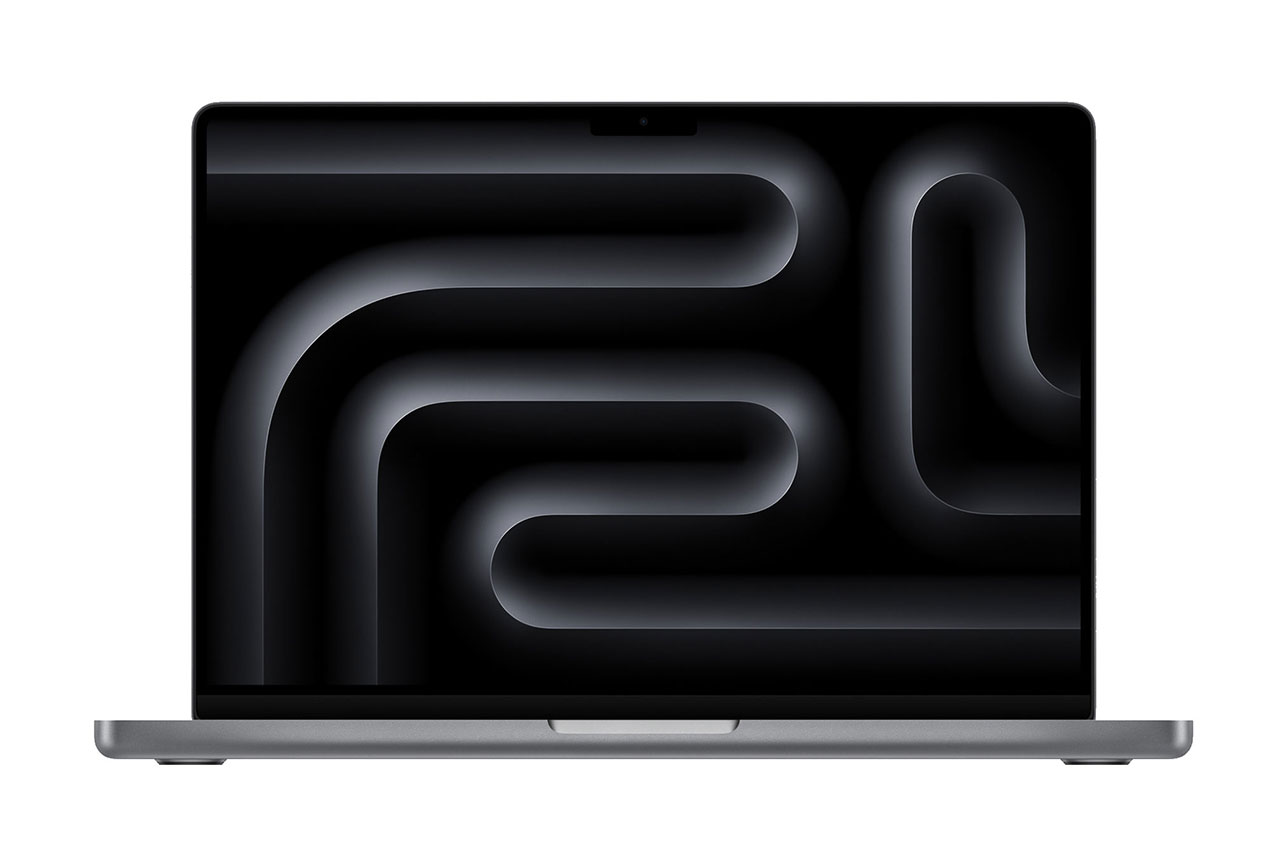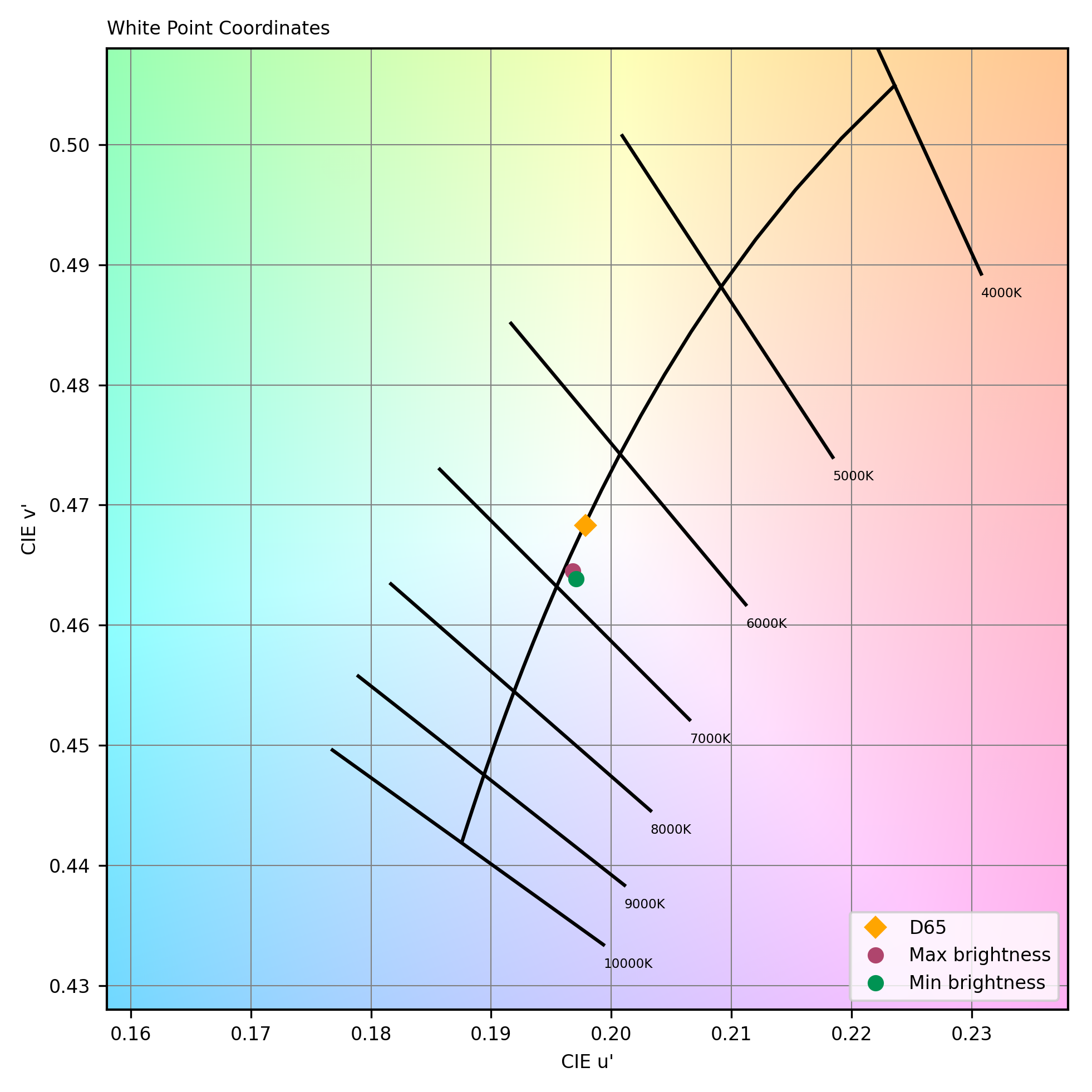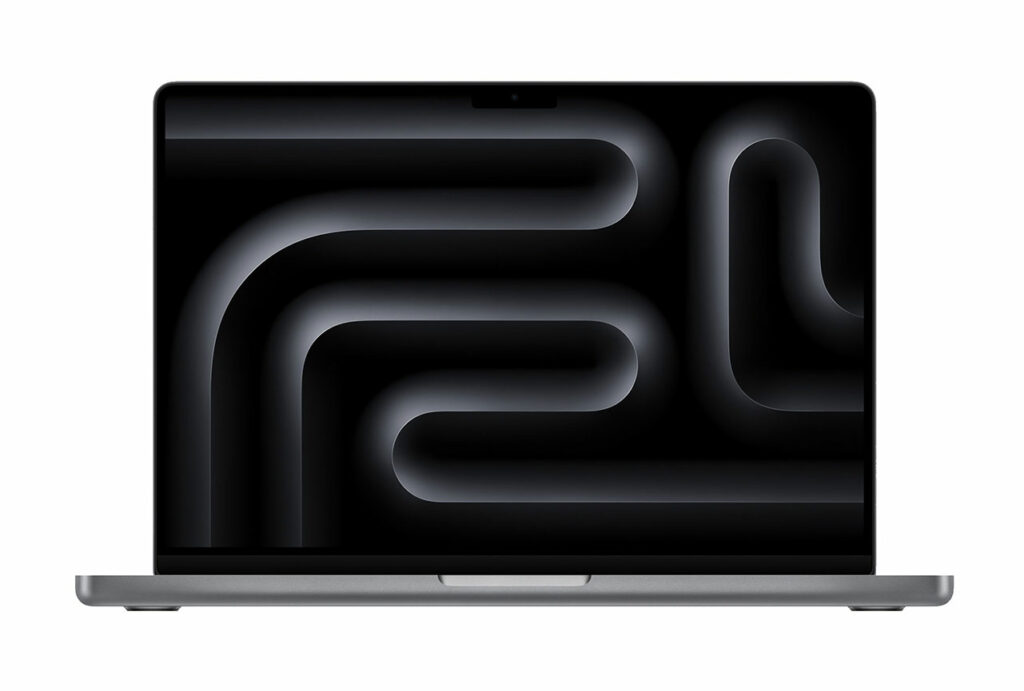We put the Apple MacBook Pro 14″ (M3 Pro, 2023) through our rigorous DXOMARK Laptop test suite to measure its performance in sound, camera and display. In this review, we will break down how it fared in a variety of tests and several common use cases.
Overview
Scoring
Use-case and feature subscores included in the calculations of the global score
 Apple MacBook Pro 14" (M3 Pro, 2023)
Apple MacBook Pro 14" (M3 Pro, 2023)

135
camera
93
Apple MacBook Pro 14" (M3 Pro, 2023)
43
Lenovo ThinkPad X9 Aura
Best: Lenovo ThinkPad X9 Aura (56)
76
Apple MacBook Pro 14" (M3 Pro, 2023)
80
Apple MacBook Pro 14" (M2 Pro, 2023)
Best: Apple MacBook Pro 14" (M2 Pro, 2023) (83)

156
display
84
Apple MacBook Pro 14" (M3 Pro, 2023)
95
Apple MacBook Pro 14" (M3 Pro, 2023)
81
Honor MagicBook View 14 (2022)
Best: Honor MagicBook View 14 (2022) (84)

144
audio
148
Apple MacBook Pro 14" (M2 Pro, 2023)
Best: Apple MacBook Pro 14" (M2 Pro, 2023) (149)
124
Acer Swift Go 14
Best: Acer Swift Go 14 (133)
90
Asus Zenbook 14X OLED (2023)
Best: Asus Zenbook 14X OLED (2023) (153)
Pros
- In video calls, camera provides a great level of detail in most conditions, with very good control of visual noise in well-exposed scenes
- Audio capture features a good tonal balance during video calls
- Excellent playback of voices that are warm, realistic and intelligible
- Best-in-class HDR video rendering with wide gamut, accurate EOTF and very high peak brightness
- Well-managed screen reflectance
- Faithful and very pleasant tonal balance for music & video
- Excellent dynamics with sharp, precise impacts and strong punch in music & video audio
- Good audio spatial rendering, with wide stereo and good distance rendition
Cons
- Occasional unnatural color rendering in some challenging scenarios
- In video calls, mono-only audio capture impairs intelligibility in stereo-capable voice call situations
- Duplex handling issues, with voices impaired by gating
The Apple MacBook Pro 14″ (M3 Pro, 2023) put in a stellar performance in our laptop tests, posting top scores in several categories among all devices tested to date. In our video call use case, the MacBook Pro’s camera provided a great level of detail in most conditions and very good control of visual noise in well-exposed scenes. Its audio capture featured good tonal balance in calls, along with warm, realistic and intelligible voices in playback,
This device makes an all-round excellent choice for both videoconferencing and personal entertainment thanks to its best-in-class HDR video rendering with wide gamut, accurate EOTF and very high peak brightness, along with outstanding audio dynamics and very pleasant tonal balance in our music & video use case.
Test summary
About DXOMARK Laptop tests: For scoring and analysis in our laptop reviews, DXOMARK engineers perform a variety of objective tests and undertake more than 20 hours of perceptual evaluations under controlled lab conditions and real-life scenarios. (For more details about the Laptop protocol, click here.)
The following section gathers key elements of our exhaustive tests and analyses performed in DXOMARK laboratories. Detailed performance evaluations in the form of reports are available upon request. Do not hesitate to contact us.
Apple MacBook Pro 14" (M3 Pro, 2023) overall & use-cases scores
Video Call
142
Apple MacBook Pro 14" (M3 Pro, 2023)
144
Apple MacBook Pro 14" (M2 Pro, 2023)
Apple MacBook Pro 14" (M2 Pro, 2023)
About DXOMARK Laptop tests
DXOMARK's Video call use case is a score that evaluates how a device handles video calls and videoconferencing in multiple conditions. This score focuses on the camera performance and the capture and playback rendering of voices.
The latest MacBook Pro’s camera had accurate face exposure with good dynamic range, along with pleasant contrast and generally accurate color rendering (only occasional unnatural-looking colors in some challenging scenes). The level of detail was high, although slight noise was sometimes visible under bright lighting conditions. The laptop managed reflections well despite its glossy screen. Although its microphones lack noise reduction, the Macbook Pro had very good and pleasant vocal timbre and intelligibility during calls. One drawback was the device’s handling of duplex speech, as two people talking at the same time could not hear one another; also, mono-only audio capture impaired intelligibility in stereo-capable voice call situations.
Camera
135
Apple MacBook Pro 14" (M3 Pro, 2023)

Highest Score
Camera texture acutance on Deadleaves with illuminance levels
This graph shows the evolution of texture acutance with the level of lux measured on a Deadleaves chart.
The following graphs show the objective measurements performed in our camera labs:
Camera visual noise evolution with illuminance levels
This graph shows the evolution of spatial visual noise with the level of lux. Spatial visual noise is measured on the visual noise chart in the video noise setup. DXOMARK visual noise measurement is derived from ISO15739 standard.
Target exposure on face with illuminance levels
These measurements take place on a setup combining realistic mannequins and a backlit panel simulating high dynamic range conditions. This graph shows the evolution of lightness measured on the forehead of the realistic mannequin with the level of lux, for multiple lighting conditions. The lightness is measured in L*. Delta EV specifies the difference of luminance in stops between the face and the light panel simulating HDR conditions.
Target exposure on face with illuminance levels in HDR conditions
These measurements take place on a setup combining realistic mannequins and a backlit panel simulating high dynamic range conditions. This graph shows the evolution of lightness measured on the forehead of the realistic mannequin with the level of lux, for multiple lighting conditions. The lightness is measured in L*. Delta EV specifies the difference of luminance in stops between the face and the light panel simulating HDR conditions.
Target exposure on face with illuminance levels in HDR conditions
These measurements take place on a setup combining realistic mannequins and a backlit panel simulating high dynamic range conditions. This graph shows the evolution of lightness measured on the forehead of the realistic mannequin with the level of lux, for multiple lighting conditions. The lightness is measured in L*. Delta EV specifies the difference of luminance in stops between the face and the light panel simulating HDR conditions.
Audio
137
Apple MacBook Pro 14" (M3 Pro, 2023)
144
Apple MacBook Pro 14" (M2 Pro, 2023)
Apple MacBook Pro 14" (M2 Pro, 2023)
Audio capture scores comparison
The following graphs show the frequency response, distortion and directivity in capture, recorded in our semi-anechoic room:
Audio capture frequency response
A 1/12 octave frequency response graph, which measures the volume of each frequency captured by the laptop when recording an objective test signal at 1 meter in an anechoic environment.
Audio capture Total Harmonic Distortion + Noise
This graph shows the Total Harmonic Distortion and Noise over the hearable frequency range. It represents the distortion and noise of the device capturing our test signal.
Audio capture directivity
Directivity graph of the laptop microphone(s) when capturing test signals using the camera app. It represents the acoustic energy (in dB) over the angle of incidence of the sound source (normalized to the angle 0°, in front of the device).
About DXOMARK Laptop tests
DXOMARK's Video and Music use case score evaluates the capability of a device to reproduce multimedia usages such as videos, movies and music playback in indoor conditions. This score focuses on the display performance and audio-playback rendering.
The MacBook Pro 14″ (M3 Pro, 2023) had great HDR video rendering with a wide gamut, accurate EOTF and appropriate brightness. It lacked some color saturation and contrast when playing SDR videos. The laptop managed reflections well despite its glossy screen thanks to its anti-reflective coating. Its audio performance was nothing short of outstanding across the board, with a faithful tonal balance in multimedia content, a deep and powerful bass, as well as punchy dynamics. This makes the device an excellent choice for video & music playback.
The following chart presents the display subscores for the multimedia use case:
Display scores comparison
The following graphs show the objective measurements performed in our display lab:
Display gamut coverage for video contents
The primary colors are measured both in HDR10 and SDR. The extracted color gamut shows the extent of the color area that the device can render. To respect the artistic intent, the measured gamut should match the master color space of each video.
Display reflectance measurement (SCI)
Measurements above show the reflection of the device within the visible spectrum range (400 nm to 700 nm). It includes both diffuse and specular reflection.
Display reflectance profile
Display brightness uniformity
0.056
cd/m²
0.058
cd/m²
0.057
cd/m²
0.058
cd/m²
0.06
cd/m²
0.058
cd/m²
0.056
cd/m²
0.057
cd/m²
0.057
cd/m²
 Distribution of brightness (min)
Distribution of brightness (min)
565.1
cd/m²
568.6
cd/m²
565.1
cd/m²
580.7
cd/m²
593.4
cd/m²
580.2
cd/m²
566.8
cd/m²
577.7
cd/m²
564.5
cd/m²
 Distribution of brightness (max)
Distribution of brightness (max)
This illustration shows the brightness measured on nine zones of the display for minimum brightness (left) and maximum brightness (right) for SDR content.
Display SDR EOTF measurement
This graph represents the rendering of contrast (gray levels) for SDR video content, measured in the dark. We expect to be close to the 2.2 or 2.4 gamma references.
Display peak brightness for video contents
Display white point
This graph represents the color temperature of white content, compared with the reference (Daylight illuminant D65) measured in the dark on video at minimum and maximum brightness.
The following chart presents the playback for the multimedia use case:
Audio playback scores comparison
The following graphs show the frequency response, distortion and directivity in multimedia playback, recorded in our semi-anechoic room:
Audio playback frequency response
A 1/12 octave frequency response graph, which measures the volume of each frequency emitted by the laptop when playing a pure-sine wave in an anechoic environment.
Audio playback Total Harmonic Distortion + Noise



 Distribution of brightness (min)
Distribution of brightness (min)
 Distribution of brightness (max)
Distribution of brightness (max)





